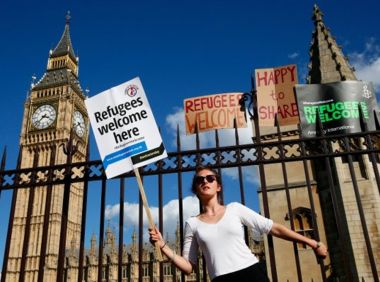Home Office wins appeal, can block Syrian refugees coming from Calais camps
The Home Office has won an appeal against a group of Syrian refugees who had been allowed to come to the UK from Calais' Jungle camp.

A landmark ruling in January meant that three teenagers and one 26-year-old who had relatives here could move to Britain immediately. Although the Home Office's case in the Court of Appeal on Tuesday was successful, it will not mean the refugees will be deported.
But Citizens UK, who bought the initial case, said the ruling could effect future claims from refugees with relatives in the UK.
The Bishop of Barking, Peter Hill, a spokesman for the campaign group said the Home Office must develop a "functional system" for identifying child refugees with potential to be reunited with their families in the UK. Relying on charities and volunteers to process claims one by one was "inefficient, costly to the taxpayer, and hugely stressful for the children", he said.
"We know of two boys who have died in the last 12 months trying to reach their families in the UK," he added.
"The government has a legal and a moral responsibility to ensure that refugee children who have close family members in the UK are granted safe passage."
The four claimants had fled Syria and one – the 26-year-old – suffers from severe mental health problems.
Under EU regulations asylum seekers must claim refuge in the first country they reach. Those with a relative in another European country can claim there but only once they have been processed in their first country.
Despite none of the four having successful claims in France, lawyers persuaded judges in January they should be allowed into the UK to claim asylum. But on Tuesday three judges "allowed" the Home Office's appeal and said bypassing the EU rules, known as the Dublin III Regulation, "can only be justified in an especially compelling case".
It continued: "In the light of the psychiatric evidence before the upper tribunal about the first four respondents and the evidence of the French lawyers and NGOs adduced by the respondents suggesting that there would be a delay of just under one year in the French system and that there was no possibility of expedition, the result the tribunal reached may have been justifiable.
"I am, however, not entirely persuaded that, had the tribunal applied the correct test, it must inevitably have reached the same conclusion. In those circumstances, the appropriate course would normally have been to remit the matter to the tribunal for reconsideration.
"However ... I have concluded that it would be inappropriate to take that course. I would therefore simply allow the appeal and make no further order."
George Gabriel, a campaigner with Citizens UK, said the ruling will make reuniting refugee children with their families in Britain more difficult.
He said: "When we brought this case, it was an enormous kick up the arse for the government, and the system is now working better because 50 children have been brought to Britain since the case.
"But it means that charities like ours will have to continue identifying children one by one, taking them through a lengthy bureaucratic process as they have to wait to be reunited with their loved ones.
"Today is a great day for bureaucrats because it means that the letter of the process will have to be followed despite the clearly unacceptable wait this leaves refugee children facing. We fear this means many will take the situation into their own hands, choosing between people traffickers on the one hand and train tracks on the other."
Tim Farron, the leader of the Liberal Democrats and an evangelical Christian, branded the Home Office "inhumane" and said: "It is disgusting that the government is putting ideology above what is best for these desperate and vulnerable children." He added there was "no doubt" it was best for the children to remain in the UK.
Yvette Cooper said she was "appalled" at the new Prime Minister Theresa May after she promised to defeat modern slavery at the weekend. The chair of Labour's refugee taskforce said the appeal would put children in "even greater risk of slavery, exploitation and abuse".











